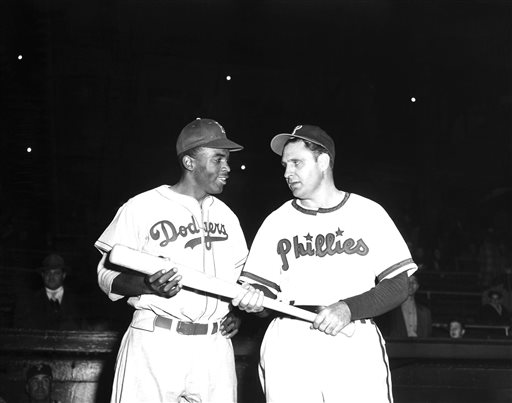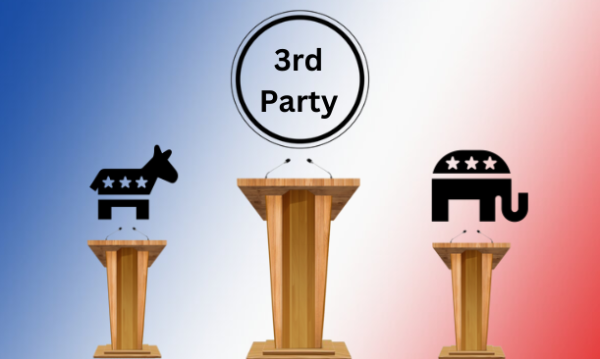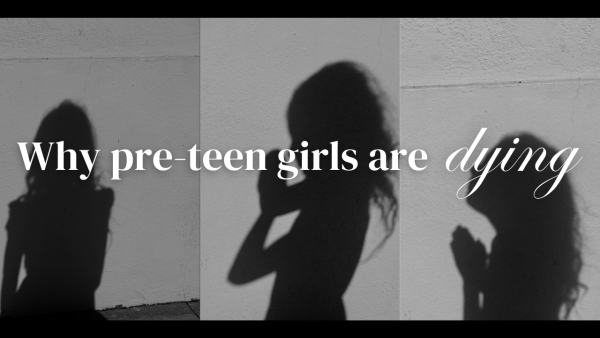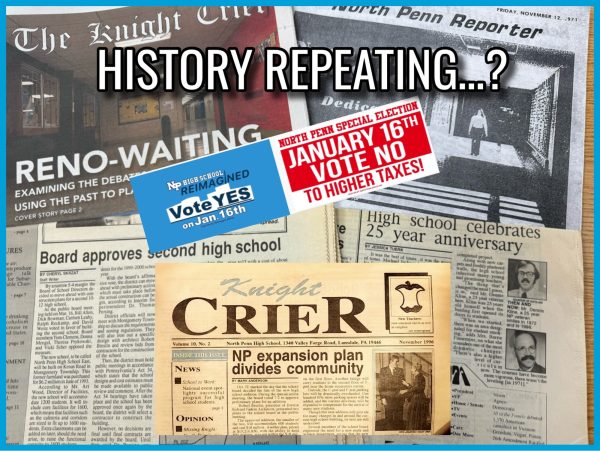Editorial: Deconstructing the myth of “black privilege”

FILE – In a May 9, 1947 file photo, Jackie Robinson, left, Brooklyn Dodgers’ first baseman, looks over the bat Philadelphia Phillies manager Ben Chapman uses during practice, as he prepared to play his first Philadelphia game for the Dodgers. The Philadelphia City Council unanimously passed a resolution Thursday, March 31, 2016, naming April 15, 2016 as a day to honor Robinson’s achievements and to apologize for the racism he faced while visiting Philadelphia in 1947. Robinson was refused service by a local hotel and then taunted by Philadelphia Phillies manager Ben Chapman, who, along with players, mercilessly hurled racial slurs at Robinson each time he came to bat. (AP Photo, File)
Recently I took a trip to the south and was confronted by the undeniable truth: race relations in this country aren’t where they need to be. Like, even close to where they need to be.
In Tennessee, I was confronted by an umpire who was all too willing to strike up a conversation with me about how in 1863, during The War of Northern Oppression (The Civil War), my ancestors did wrong by his ancestors, who were fighting for southern pride. It took everything in me to not snap back at him and correct him; “They were fighting for the proliferation of slavery.”
150 years after Appomattox Courthouse, the south still refuses to recognize that the Civil War is over, as well as the fact that the Confederacy fought it to continue the most evil institution ever implemented in this country.
This man then went on to explain to me that a black outfielder whom we had just played against, one of the best high school baseball players in the state of Tennessee, was only good due to his “inherent athletic ability.”
Now, I’m not entirely sure if he meant to say that the athleticism came from the fact that the kid was black, but that is how it came off. And that is also a common way for modern day racist white Americans to discount the athletic achievements of their black brethren.
Needless to say, I nearly vomited when I heard him say this.
This “inherent athletic ability” is just another example of black privilege.
What is black privilege you ask?
It’s a new idea emerging with white Americans unaware of racial divides. This is the idea that it is not white people who have inherited privileges in this country, it’s black people.
“Black History Month is an example of black privilege,” said Drew Domalick, a prominent conservative activist and Green Bay native in a March 31, 2016 interview with CNN “If we had a White History Month, that would be viewed as a racist holiday.”
The emerging idea is that blacks aren’t so much victims of racism as they are of special treatment – which is entirely and utterly false. The U.S., for all of the great things we have done, is also responsible for some of the worst mistreatment of different ethnic and racial groups among any first world power on earth. We have gone from slavery, to “Paid Slavery” (go look up sharecropping in the south in the late 19th century and you tell me what it reminds you of), to Jim Crow laws, to institutional and systemic racism and now the newest racist trend is writing black problems off as being another example of blacks complaining even though they are “privileged by the system.”
However this idea of black privilege is not necessarily a new one. In 1875, Congress passed legislation that banned all discrimination against former slaves in public places. However in 1883, the Supreme Court found the law to be unconstitutional. It was struck down as an infringement on state’s rights (yee haw). Justice Joseph Bradley stated in the majority opinion that “there must come a time when blacks cease to be a special favorite of the laws.”
Mind you, this decision came 18 years after the abolishment of slavery. The majority of blacks in this country were former slaves. The U.S. did almost nothing to help blacks get on their feet and assimilate into society. As well, this decision led to the creation of Jim Crow laws, which weren’t crushed until 1965, 100 years after the abolishment of slavery, and only 50 years removed from today.
To this day, the effects of such oppression can be seen in the black community. According to the 2010 U.S. Census, the wealth of white households is 13 times the median wealth of black households. Black children represent 18% of the nation’s preschool enrollment. Job applicants with white-sounding names are 50% more likely to get called back for an interview than similarly qualified applicants with black-sounding names. And prison sentences for black men are nearly 20% longer than those of white men convicted of the same crime.
But these numbers are inconsequential, right? Blacks certainly have advantages. They possess an unfair athletic advantage, remember?
Statistics aren’t even needed to prove that black privilege isn’t real. You can simply use your eyes. If being black is such an asset, why do many whites consistently move out of communities, neighborhoods, churches, and schools when too many blacks move in? This is a phenomenon called racial tipping, and it is very real and observable.
David Horowitz, author of the book, “Black Skin Privilege and the American Dream,” says that “The fact that white people are better off is not a privilege; it’s earned. It’s not white privilege that’s preventing them from doing better,” he says, “it’s their behavior, such as their inability to build more intact families.”
To those who subscribe to it, such as Horowitz, black privilege is everywhere. To them, Barack Obama, President of The United States of America was even a beneficiary of black privilege. The belief that Obama, an inexperienced senator from Illinois, would not have been elected if he wasn’t black.
Many don’t see white privilege as a bad thing, after all, not all advantages are earned. Height is an unearned perk. Good looks are an unearned perk. So being born white should be no different. As well, this idea of white privilege isn’t something that always holds true. After all, being born to an impoverished rural white family does not come with the perks that being the son of Jay-Z would come with.
However, the statistics prove that the black community deals with living behind the 8 ball much more. More than a quarter of blacks in this country are living in poverty, compared to less than 10 percent of whites who live in poverty.
And then we get to affirmative action. “How can we be privileged when we don’t benefit from affirmative action,” you can almost see a middle aged white man with his ‘Make America Great Again’ hat on whining in response to this. The only problem is, whites do in fact benefit from affirmative action programs. They just don’t realize it.
Take for example, the GI Bill. Following the Second World War, the U.S. enacted the GI Bill to pay for college education and many other financial expenses for veterans. White veterans.
These exclusionary bailout and assistance programs have been a common thread in American history. The financial aid and land grants that the U.S. gave to 19th century homesteaders, FDR’s New Deal policies that lifted the nation out of the Great Depression but were kept from blacks. The list is long.
The idea of black privilege is a cop out for whites who think that they are being targeted as the ones responsible for the plight of the blacks. It is a desperate and feeble attempt to get out of recognizing that we still have race problems in this country, and also a good way to get out of having to really do anything to combat the issue. Plain and simple. This idea needs to be nipped in the bud, and quickly. If it’s true that the rest of the world looks to us for as a model society, maybe we should try to combat our race relation problems, instead of acting like they don’t exist.












Mrs. Reich • Apr 19, 2016 at 2:18 pm
Where’s the end of the story????
adviser • Apr 19, 2016 at 7:31 pm
Sorry. I fixed it